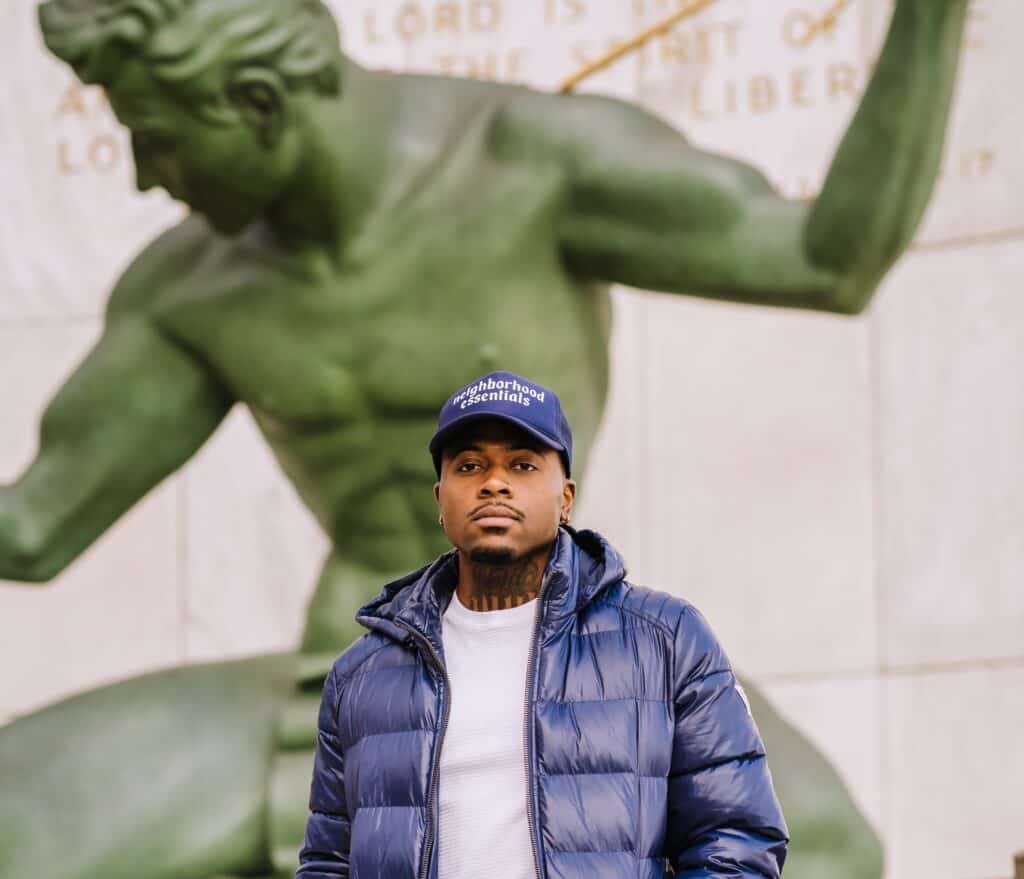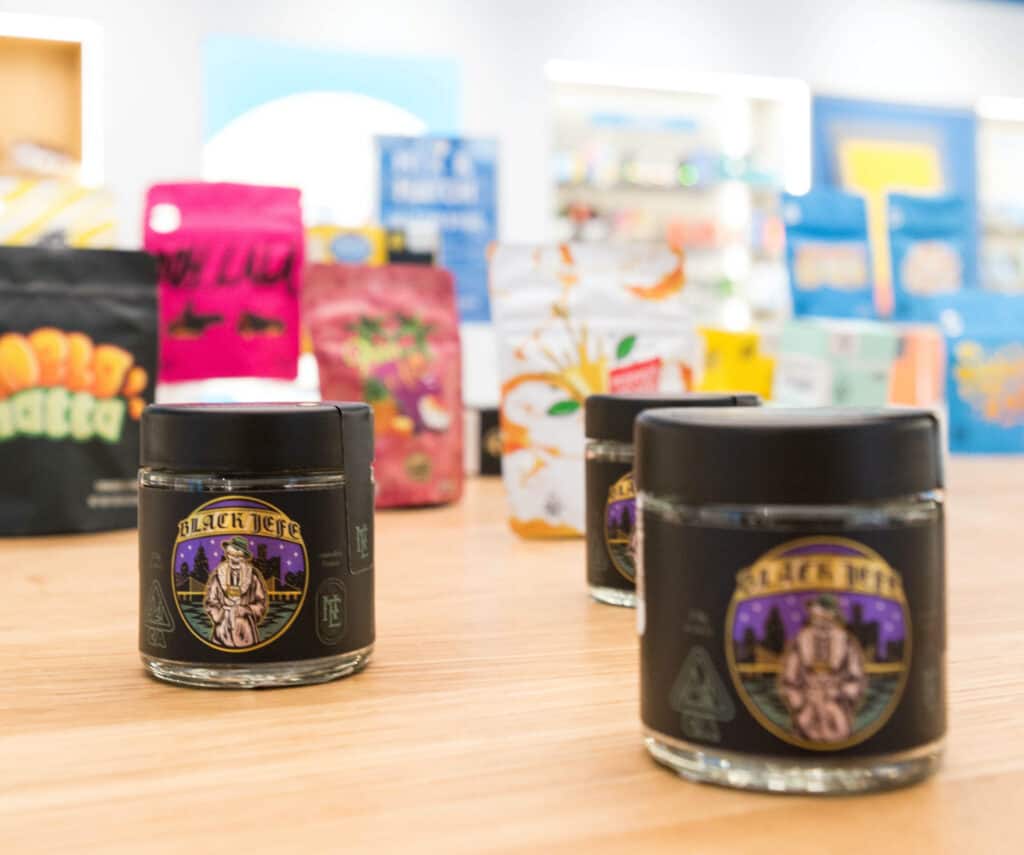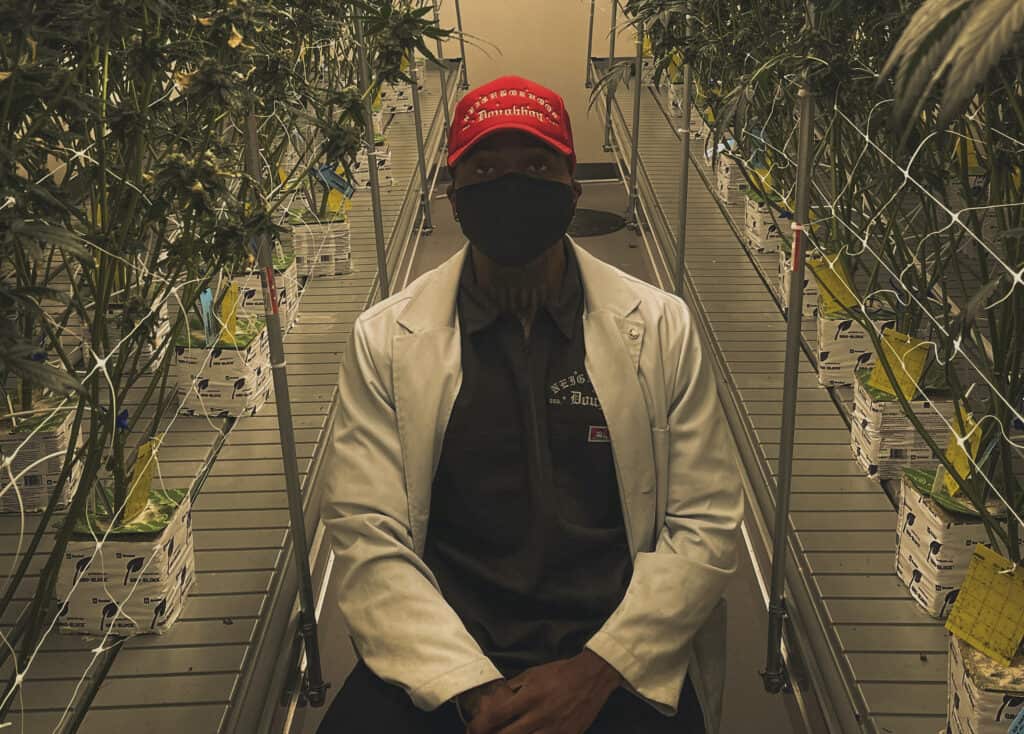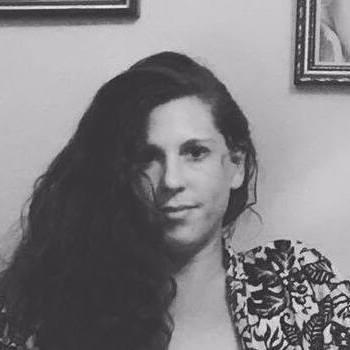Born and raised on the East Side of Detroit, there isn’t much Tre Hobbs of Neighborhood Essentials hasn’t seen. Asked how he would describe his hometown, he likens it to the videogame Grand Theft Auto. “Detroit is a wild place. I’ve seen people get killed, robbed, and go to prison.” For communities still carrying the heavy burden of collective trauma after decades of violence and mass incarceration, a company like Neighborhood Essentials can make all the difference. “Life is real for the people who my brand serves,” says Hobbs. “You have to figure out how to survive, and there aren’t a lot of ways to cope when you’re in survival mode 24/7— except pills. That’s who I’m targeting.”
The cannabis brand’s two double-infused pre-rolls, Black Jefe and Pink Buffs, offer a strong dose of medicine to consumers. “Black Jefe is on the market in California,” says Hobbs, proudly noting that it has made it onto the shelves of multiple Cookies dispensaries. In California, he sources the flower from SF Roots, a Black-owned brand known for their dank weed. “It’s an indica, and it’s real strong like that old school funk. It’s a heavy hitter, testing close to 29% THC,” Hobbs says. The sativa strain was named after Pink Buff Cartier glasses, the ne plus ultra of Detroit fashion when Hobbs was growing up, and he describes it as “a real focused type of sativa.”
As a growing cannabis brand, Hobbs says the company is ready to build on its solid foundations. Back in Detroit, they’re preparing to launch Diamonds and Pearls, which Hobbs says is a “real pretty indica dominant strain,” and are gearing up to become vertically integrated.
It’s important for Hobbs to have a hand in cultivation, because the Neighborhood Essentials project is bigger than just selling weed. “When people smoke my flower, they get the energy I put into it,” he explains. “That’s why I’m pushing for us to raise it. The love and care we want to put into it is just like the energy you get from eating well. It’s not about making it commercialized — none of that suit and tie energy.” Hobbs hopes that the energy he puts into his products can bring his people the healing they need. “I come from a high-stress community with a lot of mental issues that aren’t brought to light,” says Hobbs. “Cannabis is just the first stop to bring light to mental health in my community.”
For Hobbs, consuming cannabis is an important part of treating his PTSD from the War on Drugs. But he’s only recently been able to turn to plant medicine for help. As a young Black man growing up in Detroit, the odds that he would end up dead or in jail were already high without the added risk of cannabis consumption. “I always thought, there’s more out here than this,” he says. He began playing football and was always careful to avoid smoking, because as he put it, “I was playing football for something bigger than myself. I wanted to get my family out, and didn’t want to do anything to jeopardize that.”
His gamble paid off when he got an opportunity to play college football in South Dakota. He was on track to go pro as a wide receiver when he got injured. “After my injury I started seeing the plant medicine,” says Hobbs.
Trying to envision a life without football, Hobbs took a trip out to the West Coast to visit friends who helped further his cannabis education. “I was part of the legacy market for a little while, and I started meeting people,” says Hobbs. He credits the legacy California growers with showing him the ropes of both navigating the industry and cultivating the plant. “It’s a blessing to be able to operate in California and learn from the OGs who originated the game.” He was also exposed to a different type of work ethic than the more linear approach he learned back home in the Rust Belt.
“Cali opened my mind with people showing me how to really move in this industry. I come from go go go, but they showed me how to slow down a little, so I was able to examine things I didn’t catch before,” he says. “They hustle in Cali, since it’s so expensive there, but I saw there’s a time and place for everything.”
But as much as Hobbs thrived on the West Coast, he was never tempted to leave Detroit behind. “I love my city. I wouldn’t be who I am without my people. In the community, we need each other— nobody thinks about us but us. We’re forgotten people.” For Hobbs, the goal is to give the people of Detroit the chance to show the world what they can do. As much as the city has made headlines for drugs and violence, Hobbs wants people to know how much good there is too.
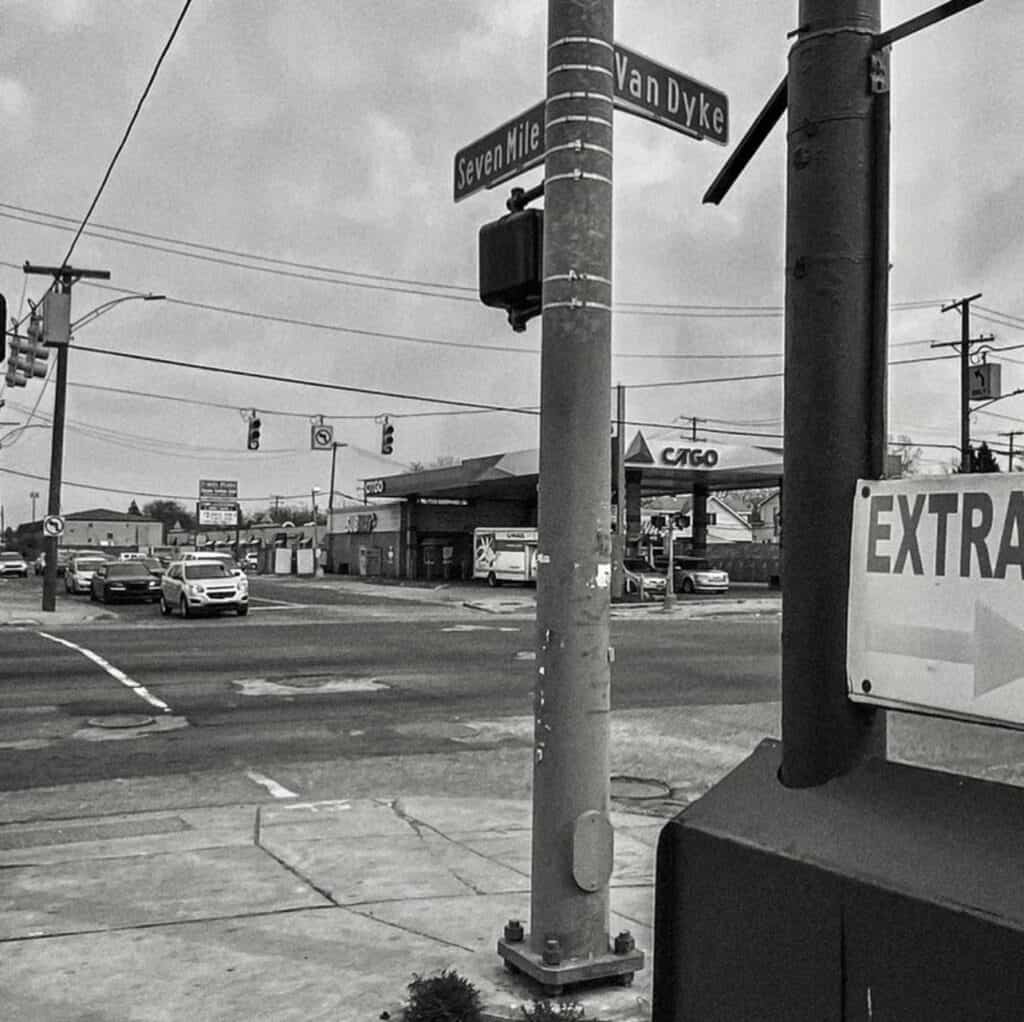
“It’s never just all bad— there’s always a yin and yang balance in life,” he says. He sees himself as part of a larger Detroit tradition of community members helping each other up when they’re down. “I’ve seen mothers who lost sons to gun violence start programs to steer people away from that life, people who grow up in poverty with a food program to feed the homeless people, people on pills or meth flip things around and start helping other people get through that,” he says.
Hobbs makes it clear that this ethos didn’t come easy.“It was bred out of pain,” he says, noting that in their darkest moments his community had no one to depend on but each other. During the War on Drugs, Black Detroit residents had very little protection under the law; throughout the ‘80s and ‘90s, police brutality in Detroit went almost completely unchecked. National hysteria concerning the crack epidemic reached a fever pitch, resulting in an increasingly militarized police force.
When Operation Crack Crime began in Detroit in 1986, police violence in Detroit neighborhoods escalated dramatically. A 1987 Detroit Police Department manual stated that the “reasonable suspicion” of criminal intent was enough to detain a civilian, and a violation of the rules surrounding police conduct could be waved away at the discretion of the Chief of Police, since “extenuating circumstances exist or the best interest of the department would not be served.” Police were given almost carte blanche to conduct raids in the homes of the inner city’s primarily Black residents, department corruption raged, and the homicide unit’s habit of forcing testimonies out of witnesses often led to wrongful convictions.
For Hobbs, abuse of police power was a feature of daily life in his neighborhood. “I’ve seen police come to the hood and drop off guns and drugs and come back around and arrest people for those same things,” he said. “Police abuse is something I’d see every day. Being called the n-word, getting thrown up against the wall by police, that was just normal in that environment.”
While the distribution of crack cocaine was ostensibly the reasoning behind state violence during these years, cannabis was just as often the focus of police raids. Hobbs remembers witnessing one such incident as a child. “I grew up in the police raids. When I was younger, eight or nine, I was at my auntie’s house with my cousins when the police raided. They had heard there was weed in the house, and they pinned everybody up against the wall, busting down doors, breaking the toilet trying to find something that wasn’t there,” he says.
The criminalization of cannabis was especially painful for the people trying to survive the odds in Detroit, since cannabis was one of their only true sources of relief. “I come from an alcoholic family,” says Hobbs. “I’ve seen the difference in my dad when he drinks and when he smokes. He’s chill, goofy, feeling good when he smokes.” When he was growing up his parents raised cannabis plants in the basement from seed, and it became a lifeline for the family.
“My mom worked a factory job my entire life, and I’d see her body aches, high anxiety, and stress. But coming home from a factory job with kids, the stress from work wouldn’t relay to the house when she was smoking,” says Hobbs, who is thrilled to be in a position to bring her that ease. “Now every time I see my mama I get her high,” he says.
Strong family and community ties make it easy for Hobbs to focus on social impact over profit; the top priority for Neighborhood Essentials is to represent the needs of those who might otherwise find themselves steamrolled by an accelerating legal market. In his mind, it’s a matter of harnessing the transformative power of cannabis for his community and others like it. As their website puts it: “On the surface we’re a cannabis brand. But our roots are connected to the voices of the unheard and we’re here to empower them.”
Their mission is more clear than ever now that Neighborhood Essentials is poised to become an industry leader. Hobbs has recently joined the board of Eaze’s Michigan branch. “I’m glad to be in that space, so I can relay the message of what the community needs,” he says. “I’m learning a lot from them, and they’re learning a lot from me.”
Hobbs knows that business runs on more than just ethics, pointing out that “even the good takes money in this world,” but he doesn’t see the two as mutually exclusive. “We want to bring some people who are willing to invest and understand sustainability in our space,” he says, something that seems close at hand given the glowing reception Neighborhood Essentials received at MJ Unpacked. “At one point I had a line of people waiting to talk to me — I swear it’s the most talking I’ve ever done in my life,” he laughs. Like other members of the social equity cannabis network, he believes there’s enough money in the industry to go around, and together they aim to prove it. “I’m over here in minority communities trying to do something great, and we need that all around the country. We have to stand up for what’s right, and the network is growing for sure.”


